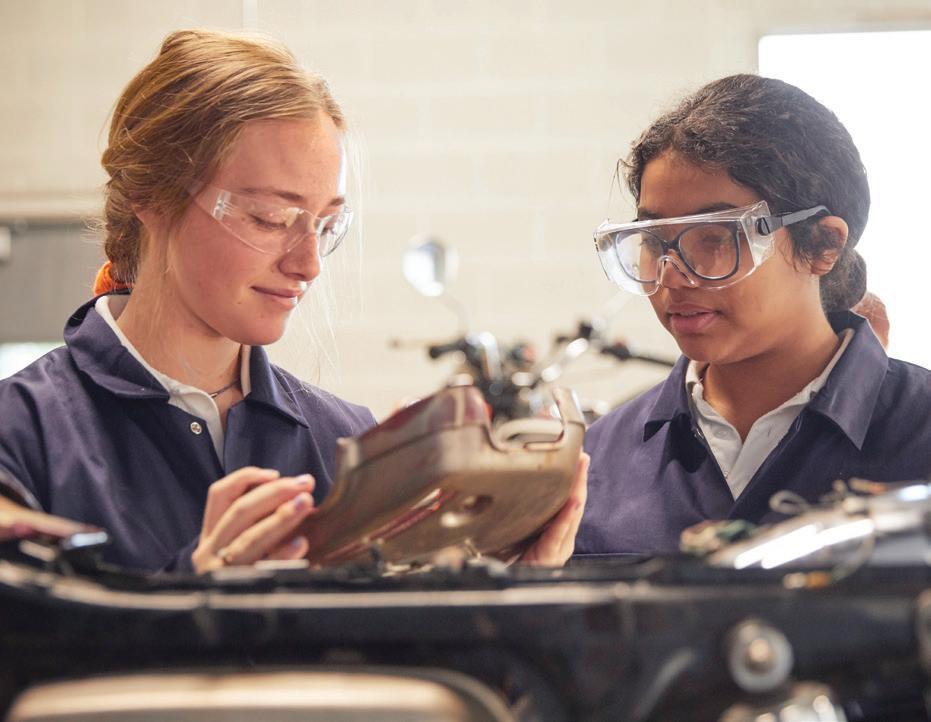
3 minute read
DEVELOPING TOMORROW’S LEADERS
Marilyn Arundel, dean of faculty and academics at Magnificat High School, said students were able to participate virtually in the Engineering Tomorrow program in Washington D.C. – an opportunity that isn’t typically available to them. Inspired by what they learned in the program, this year students will take advantage of a technology for a social good program where they will have an opportunity to develop their own apps and other tech-based solutions.
On a more elemental level, faculty are grappling with the idea of teaching global citizenship – with or without travel.
Advertisement
“The question became, ‘how do we connect with global issues without traveling?’ It might not be as exciting, but the mission is the same,” Ciuni says.
As for the coming year? Well, it’s not clear.
“We’ll likely take the first semester to continually re-evaluate,” Ciuni says. “We’re still looking at the feasibility of off-campus travel. We’re not quite ready for international travel.” “We’re planning on doing some traveling with kids next summer,” says Fior of Saint Ignatius. “Hopefully we can get our hands around this COVID situation as a country.”
The world may not be ready for American students. While various COVID-19 vaccines are widely available in the United States, they’re not so prevalent throughout the world. An Olympics was played in Japan as cases continued to rise. Death rates are soaring in South America. And vaccines remain in short supply in the European Union.
“If we’re teaching kids to be global citizens, the most ethical thing to do is not travel,” Ciuni says. “I know it’s a hard pill to swallow, but if our hosts aren’t ready for us, we shouldn’t be guests.”
Local private and parochial schools adapted their curricula during the pandemic to ensure students still were able to access a 21st-century global education.
By VINCE GUERRIERI
Crain’s Content Studio — Cleveland
Leadership can show itself in many ways, from a CEO directing a multinational corporation to a quarterback adjusting on the fly to a busted play.
And much as it can be demonstrated in multiple ways, there’s no “right” way to teach leadership – and it can be taught.
“We don’t believe that some students are leaders and others are not,” says Kimberley Berndt, director of Laurel’s Upper School. “That would be a very fixed mindset. Rather, we believe that we need to provide a variety of opportunities for deliberate practice for all students so that they can develop as leaders in their own unique and important ways.”
There are any number of skills that can be considered vital to being a good leader, but they all have one thing in common, says Malone University Provost Greg Miller: They’re all part of the foundation of a liberal arts education. “So-called soft skills are really what we call leadership skills,” he says.
As the name implies, soft skills are the opposite of hard skills – defined technical skills, that include everything from driving a car to computer programming. On the other hand, soft skills are those that aren’t necessarily as quanitifiable, but just as important.
It starts with the ability to communicate effectively, on many levels. The mission of some schools – like Saint Ignatius, a Jesuit all-boys school in Cleveland’s Ohio City neighborhood – bakes in communication skills. “Every student has an experience of public speaking in class,” says principal Anthony Fior. “To be able to articulate your thoughts orally is an important part of today’s world – and it’s always been a part of Jesuit learning.”

Students at Magnificat High School, an all-girls school, are encouraged to demonstrate leadership in different ways, including listening, engaging and developing an action plan to address real-world challenges. (Continued on page 32)










